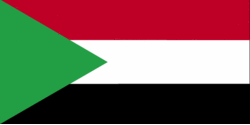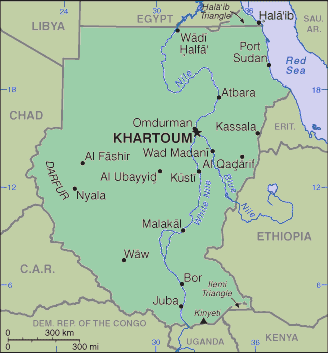Traveling Luck for Sudan. Sudan, Africa
Sudan is located in Northern Africa, bordering the Red Sea, between Egypt and Eritrea.
Land in Sudan is generally flat, featureless plain; mountains in far south, northeast and west; desert dominates the north.
Sudanese land covers an area of 2505810 square kilometers which is slightly more than one-quarter the size of the US
Sudan has borders with Chad for 1360km, Egypt for 1273km, Central African Republic for 1165km, Kenya for 232km, Uganda for 435km, Congo (Kinshasa) for 628km, Ethiopia for 1606km, Eritrea for 605km and Libya for 383km.
 Sudanese national flag (Flag of Sudan)
Sudanese national flag (Flag of Sudan)
As for the Sudanese climate; tropical in south; arid desert in north; rainy season varies by region (April to November).
Sudanese (singular and plural) speak Arabic (official), Nubian, Ta Bedawie, diverse dialects of Nilotic, Nilo-Hamitic, Sudanic languages, English
note: program of "Arabization" in process.
Places of note in Sudan
 Sudanese map
Sudanese map
Regions of Sudan
- A‘alī an Nīl
- Al Baḩr al Aḩmar
- Al Buḩayrāt
- Al Jazīrah
- Al Kharţūm
- Al Qaḑārif
- Al Waḩdah
- An Nīl al Abyaḑ
- An Nīl al Azraq
- Ash Shamālīyah
- Baḩr al Jabal
- Gharb al Istiwāʼīyah
- Gharb Baḩr al Ghazāl
- Gharb Dārfūr
- Gharb Kurdufān
- Janūb Dārfūr
- Janūb Kurdufān
- Junqalī
- Kassalā
- Nahr an Nīl
- Shamāl Baḩr al Ghazāl
- Shamāl Dārfūr
- Shamāl Kurdufān
- Sharq al Istiwāʼīyah
- Sinnār
- (SU26)
- (SU27)
- (SU28)
- (SU30)
- (SU31)
- (SU32)
- (SU33)
- (SU34)
- Sudan (general)
- Warab
Military regimes favoring Islamic-oriented governments have dominated national politics since independence from the UK in 1956. Sudan was embroiled in two prolonged civil wars during most of the remainder of the 20th century. These conflicts were rooted in northern economic, political, and social domination of largely non-Muslim, non-Arab southern Sudanese. The first civil war ended in 1972, but broke out again in 1983. The second war and famine-related effects resulted in more than 4 million people displaced and, according to rebel estimates, more than 2 million deaths over a period of two decades. Peace talks gained momentum in 2002-04 with the signing of several accords; a final Naivasha peace treaty of January 2005 granted the southern rebels autonomy for six years, after which a referendum for independence is scheduled to be held. A separate conflict that broke out in the western region of Darfur in 2003 has resulted in at least 200,000 deaths and nearly 2 million displaced; as of late 2005, peacekeeping troops were struggling to stabilize the situation. Sudan also has faced large refugee influxes from neighboring countries, primarily Ethiopia and Chad, and armed conflict, poor transport infrastructure, and lack of government support have chronically obstructed the provision of humanitarian assistance to affected populations.
Sudan has turned around a struggling economy with sound economic policies and infrastructure investments, but it still faces formidable economic problems, starting from its low level of per capita output. From 1997 to date, Sudan has been implementing IMF macroeconomic reforms. In 1999, Sudan began exporting crude oil and in the last quarter of 1999 recorded its first trade surplus, which, along with monetary policy, has stabilized the exchange rate. Increased oil production, revived light industry, and expanded export processing zones helped sustain GDP growth at 8.6% in 2004. Agricultural production remains Sudan's most important sector, employing 80% of the work force, contributing 39% of GDP, and accounting for most of GDP growth, but most farms remain rain-fed and susceptible to drought. Chronic instability - resulting from the long-standing civil war between the Muslim north and the Christian/pagan south, adverse weather, and weak world agricultural prices - ensure that much of the population will remain at or below the poverty line for years.
Sudanese natural resources include petroleum; small reserves of iron ore, copper, chromium ore, zinc, tungsten, mica, silver, gold, hydropower
largest country in Africa; dominated by the Nile and its tributaries
Sudanese religion is Sunni Muslim 70% (in north), indigenous beliefs 25%, Christian 5% (mostly in south and Khartoum).
Natural hazards in Sudan include dust storms and periodic persistent droughts.
Travel Advice for Sudan
SudanSUMMARY
- On 26 January 2007, UN troops were ambushed near Opari, some 100km South East of Juba near Torit and Pageri. One UN peacekeeper was shot and killed.
- On 24 January 2007, a Sudanese Air West passenger plane was hijacked en route from Khartoum to Nyala (in Darfur). The aircraft later landed in Chad and all passengers and crew were released.
- We advise against all travel to the Eritrean border, and against all but essential travel to Kassala.
- We advise against all travel near the Chadian border with Darfur and all but essential travel to Darfur where conflict continues. On 5 December, there were reports of fighting between rebel groups and militias in and around El-Fasher. The situation remains volatile. We advise all British citizens in and around El-Fasher, in North Darfur State, to limit their movements and exercise extreme caution.
- Banditry in Darfur is widespread and great caution is needed when travelling outside the major population centres or at night. There have been several incidents involving NGO and UN staff and some African Union peace monitoring troops have been killed.
- We advise against all travel south of Juba in Central and East Equatoria. We also advise against all travel in West Equatoria within 40kms of the border with DRC. There have been a number of fatal attacks against people working for aid organisations in areas near to the Ugandan border in southern Sudan.
- We advise against all travel to Malakal (Upper Nile State) where armed fighting broke out on 27 November 2006 between Sudanese People’s Liberation Army (SPLA) and armed militia groups. Some UN and NGO staff have been evacuated from the area and tensions remain high.
- We advise against all but essential travel to all other parts of southern Sudan, including Juba. The situation throughout southern Sudan is volatile. There have been robberies and violence against NGO and UN staff.
- You should be aware of a high threat from terrorism. Attacks could happen anywhere in Sudan and may be against Western targets
- The Comprehensive Peace Agreement signed in January 2005 has effectively brought to an end the north-south civil war. However, some areas remain tense. Some recent demonstrations have resulted in injuries to protestors. You should remain vigilant and avoid demonstrations or similar large gatherings in public places.
- We strongly recommend that you obtain comprehensive travel and medical insurance before travelling. You should check any exclusions, and that your policy covers you for the activities you want to undertake. Please see: Travel Insurance. You should register with the British Embassy in Khartoum on arrival and keep in touch throughout your stay.
SAFETY AND SECURITY
Sudan Country Profile.
LOCAL LAWS AND CUSTOMS
ENTRY REQUIREMENTS
Your Passport must have a minimum of six months validity from the date of arrival in Sudan.
If you have a flight out of Sudan, you should note exit visa requirements.
Single parents or other adults travelling alone with children should be aware that some countries require documentary evidence of parental responsibility before allowing lone parents to enter the country or, in some cases, before permitting the children to leave the country. For further information on exactly what will be required at immigration please contact the Sudanese Embassy in London.
If you do not hold a diplomatic passport you are required to register with the Aliens Department within three days of your arrival in the country (2 passport size photos are needed and the fee is the Dinar equivalent of around £15). Once registered, you are not required to obtain an exit visa to leave the country. You are required to pay US$20 per person airport tax.
HEALTH
Avian Influenza (Bird Flu)
In September 2006, local health authorities confirmed the deaths of poultry from Avian Influenza (also known as Bird Flu) in Juba, the capital of Southern Sudan. This follows a series of separate outbreaks near Khartoum, in central Sudan, in April 2006. No confirmed human infections or deaths have been reported.
GENERAL
You should register with the British Embassy in Khartoum on arrival and keep in touch throughout your stay.
Money: Credit cards and travellers' cheques are not usually acceptable in Sudan. It is not possible to obtain cash against credit cards at banks and credit cards are not acceptable at hotels to settle bills. Neither is it possible to cash travellers' cheques through the local banking system in Sudan. You should ensure that you have sufficient hard currency, preferably US Dollars, to cover expenses during your stay.
There is no legal requirement to carry identification documents but we strongly recommend that you carry a form of photo identification with you at all times.
You should ensure that onward or return flights are reconfirmed with the airline at least 72 hours before departure.

 Search
Search Sudan country profile
Sudan country profile Travel advice for Sudan
Travel advice for Sudan